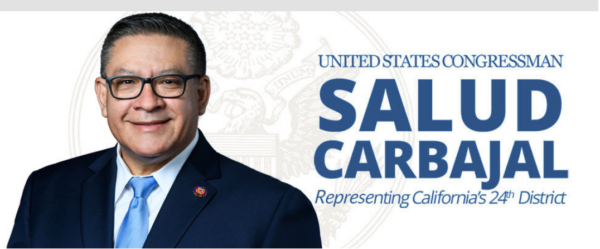What you need to know about a possible government shutdown
September 28, 2023

Opinion by U.S. Congressman Salud Carbajal
You may be hearing about a potential government shutdown at the end of this week.
Here’s the bottom line: the extreme right-wing of the U.S. House of Representatives is once again holding our government hostage, this time blocking the passage of bipartisan funding bills unless they can enact devastating cuts and push more of their culture wars.
I have been hard at work in Washington trying to prevent this unnecessary and avoiable crisis – but I want to make sure you know how you, your family, and our nation might be impacted.
How will a shutdown impact me?
If the federal government shuts down, our communities, economy, and national security can all be affected.
- Millions of workers, including more than 6,000 on the Central Coast and 140,000 in California, would be furloughed – putting the health and economic security of families at risk across the nation.
- American servicemembers and other critical personnel would continue working to protect our national security, but would not receive a paycheck until the shutdown is ended.
- Nearly 7 million women and children who count on federal food assistance program would soon start being turned away at grocery store counters.
- Travelers may face delays at airports and in other federal transit hubs Food safety and other inspections may be delayed, putting the health and wellbeing of families at risk.
While certain benefits – like Social Security, Medicare, SNAP, and Veterans Affairs – will still be available, there may still be delays across the federal government with these and other critical services.
I will be providing up-to-date guidance from federal agencies on what to expect if there is a government shutdown.
What about federal spending levels?
Let me be absolutely clear: a government shutdown does nothing to halt government spending. In fact, a government shutdown will likely put the U.S. in more debt than before the shutdown began.
The workers who are furloughed and those who will continue working without paychecks would still get paid when the shutdown is over. But a shutdown would still cause unnecessary pain for those families in the short term who will have to dip into savings or take on debt in the interim to cover their essential expenses.
With many federal agencies and national parks closed, the government will actually lose revenue it would have otherwise collected, meaning our deficit may be even higher than it would have been before a shutdown.
A government shutdown is also detrimental to our economy, which in the long run will also increase our federal debt.
The last one cost our economy $11 billion in lost economic activity, and delayed over $2 billion in loans to small businesses. The 2013 shutdown cost our economy $1.5 billion in just two weeks.
What I’m doing to avert this shutdown
Last week, I joined 97 of my colleagues from the New Democrat Coalition, a pragmatic group of Democrats of which I am a vice chair, in urging House Speaker Kevin McCarthy to drop the extreme-right’s demands and keep his promise from May to work across the aisle and keep the government open.
My colleagues and I in the bipartisan Problem Solvers Caucus, which is a group of 64 Democrats and Republicans committed to governing, devised and endorsed a framework that would avert a government shutdown and keep our government operating through the remainder of this year.
I am committed to preventing this avoidable crisis and I will be working hard to ensure that Congress completes its most fundamental job: keeping our government open.
And I will keep working in these remaining days to prevent a damaging shutdown – as well as keep you updated on potential impacts as we receive updated guidance from our federal agencies.






The comments below represent the opinion of the writer and do not represent the views or policies of CalCoastNews.com. Please address the Policies, events and arguments, not the person. Constructive debate is good; mockery, taunting, and name calling is not. Comment Guidelines